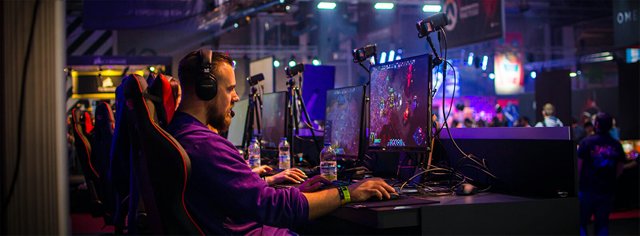Blockchain is Actually an Unexpected Gift to Gamers
Look gamers, we get it. Cryptocurrency mining is driving up the cost of pc gaming hardware and making it harder to access the high end components you’ve been pining over. If you zoom out, though, you’ll see that blockchain is about to upgrade gaming industry itself. Here are some reasons to believe blockchain will be a tremendous boon for gaming.
Leveling Up eSports and Professional Gaming
Just last month, a supreme court decision made sports betting legal in the United States, eSports included. While there were already several blockchain based eSports betting platforms, the supreme court ruling will open the floodgates for them to flourish.
HEROcoin is one of the projects seeking to make eSports betting more legitimate using blockchain. The project aims to create a more fair, trustworthy and transparent betting experience than traditional, centralized platforms. Blockchain helps it achieve that end by allowing the team to step out of the way as a middle-man and let the community itself be the ‘house’. It’s a shift that allows users access to information they wouldn’t normally have, allows them to interact with each other directly, and removes the need for a centralized party to control the flow of money. No mafia goonies necessary in this betting house!
The flourishing of eSports betting platforms like HEROcoin will drive significant amounts of money into the eSports industry. Moreover, it will create new opportunities for video game enthusiasts to make a living off of their involvement with games. If you’re too much of a noob to make it in competitive gaming, you can always make a living betting!
Blockchain is also being used to build platforms to manage the logistics of running eSports teams. A company called DreamTeam is leading this charge. Their platform not only utilizes blockchain for payments, but for smart contracts to handle player transfers, sponsorship and advertising agreements, and tournament prizes.
With the many scandals the eSports scene has suffered in recent years, platforms like DreamTeam’s will offer more legitimacy and eliminate the types of risks that would stifle the growth of the industry.
A Power Up for Community Building
Decentraland is more than a game. The developers refer to it as a “public virtual world” that uses the Ethereum blockchain to manage in game property rights. The virtual world also has its own cryptocurrency called MANA which can be used to buy land as well as user created goods and services.
The use of blockchain in this case is tremendously practical as it will enable the virtual worlds economy to thrive and take on a life of its own, especially considering it’ll likely have a large international presence. A player in Russia selling a player in the U.S. an item will be significantly easier using MANA than it would be using fiat currencies.
If a video game or virtual world having its own thriving economy sounds crazy, consider the World of Warcraft, who’s in game currency ‘gold’ is now worth 7 times as much as Venezuela’s currency. It’s a good thing for Venezuela that the World of Warcraft doesn’t offer passports as well.
By giving games their own cryptocurrencies and making it a core part of the experience rather than just a tangential offshoot, game developers could dramatically enrich social interactions. Not to mention, the incentive to play becomes that much stronger when your in game rewards can have real world value. Mothers everywhere will have to stop claiming that playing games are a waste of time and won’t get you anywhere in life!
Several companies are looking to take the idea of video game cryptocurrency a bit further. Enjin Coin is building blockchain based platform and cryptocurrency that is intended to transcend the communities of individual games and facilitate cross-game item ownership and trading. In most games up to this point, users could spend massive amounts of time acquiring special game objects but when they inevitably stop playing a game, all of that value is effectively lost. With Enjin Coin, players can sell off that rare magical sword and carry their coin over to another game. If the project is successful, Enjin Coin will create a meta-community that unites the communities of the many games using it’s platform.
Making Games More Like Living, Breathing Universes
Zooming out, blockchain is about to make video games far more rewarding and immersive. Whether or not any of the aforementioned projects are successful, it's clear we're on a blockchain driven trajectory. With a booming eSport community allowing many more video game enthusiast to make a living off of their involvement in games and more complex and rich social systems and economics, players are likely to become far more absorbed in their game of choice. They will have both more time and more incentive to do so.
World of Warcraft captivated the hearts and minds of millions of gamers after its 2004 release, with the upper 25% of players putting in more that 5 hours per day, on average. Those hours spent are becoming far more economically valuable due to the rise of eSports, YouTube, live streaming and next, blockchain. What happens when the gamers who spent that time don’t have to go to school or to their 9 to 5 jobs because of the economic viability of their passion for gaming? What happens when the social dynamics and economics of virtual worlds become as rich and compelling as the real worlds? With the help of blockchain, we’ll soon know the answer.

